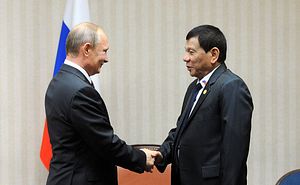As expected, the visit by two Russian vessels to the Philippines last week has since led to speculation about a burgeoning relationship between the two countries amid President Rodrigo Duterte’s stated desire to diversify his country’s relationships away from its traditional ally, the United States (See: “The Limits of Duterte’s China-US Rebalance”).
On Monday, this narrative was fueled by news that the Philippines may conclude a military deal with Russia that could see the bilateral defense relationship take off. The news was prompted by comments made by Philippine Defense Secretary Delfin Lorenzana in an interview that Manila was finalizing a military agreement that is expected to be signed when President Rodrigo Duterte visits Russia later this year for a much-anticipated summit with his Russian counterpart Vladimir Putin.
If completed, such an agreement would no doubt be a boost for defense relations. When it comes to military ties, since Manila and Moscow are starting from a fairly low point, there is naturally a lot of room left for potential growth. It should also be viewed in light of other promising developments within the relationship, including possible deals related to defense equipment now being discussed.
That said, as I have emphasized previously, it is also important to keep in mind the limits of Russia-Philippines defense relations (See: “The Limits of Russia-Philippines Military Relations”).
For instance, the visit of Russian warships to the Philippines – a rather routine affair for several of Manila’s partners – was reportedly just the third such interaction between the two sides (See: “Why Are Russian Warships in the Philippines?”). And despite the sensationalist commentary in some international media outlets, Russia’s own ambassador to the Philippines admitted at a press conference on board one of the ships last week that he was surprised that not a single Philippine media outlet had covered the visit, an indicator of the low awareness that exists about the relationship.
In the case of the defense agreement that Lorenzana was referring to this week, there is also arguably much less than meets the eye.
First, the agreement itself is not new, but a preexisting one. Lorenzana was merely suggesting that the Philippines would aim to realize a military cooperation agreement with Russia mulled under then-President Benigno Aquino III, rather than work out and ink a new pact with Moscow altogether. And as he made clear, this is a far, far cry from the military alliance that the Philippines enjoys with the United States, which is based on the Mutual Defense Treaty of 1951, which provides for Washington’s defense of Manila under certain conditions, as well as agreements such as the Enhanced Defense Cooperation Agreement (EDCA) that allow the rotational presence of U.S. troops and equipment (See: “Where Are US-Philippine Relations Under Duterte?”).
Second, the scope of the MoU is quite circumscribed, at least for now. Lorenzana said that the agreement would allow things like the exchange of personnel, visits, as well as the observation of military exercises (as opposed to conducting them). On joint drills in particular, he stressed that while Russia would like to conduct them with the Philippines, Manila would still need to determine the “specifics of what is acceptable,” which would also be an interagency process involving the foreign ministry.
Those kinds of qualifications from the Philippines’ defense chief are important. This is especially the case since it is just the latest in a string of statements where Lorenzana has sought to emphasize the aggressiveness with which Russia has sought to improve the relationship with the Philippines on the one hand, and the more cautious approach adopted by the bureaucracy in Manila on the other (as opposed to Duterte’s own enthusiasm). Following his return from a trip to Moscow last month to assess the potential for arms deals, for instance, Lorenzana repeated his sober assessment that despite Duterte’s desire for purchases and transfers to occur, there remained issues that limited the extent to which this was possible, including cost and interoperability.
Third, amid the hype that has occurred, it is important to remember that the completion of the agreement is far more conditional than the certitude with which it is being portrayed. Lorenzana clearly emphasized that while the pact’s completion is likely and that it is almost finished as it is but for the “nitty gritty,” it will still need to go through the aforementioned interagency process and some discussion between the two sides. As with other agreements of its ilk, the devil is often in the details.
Fourth and finally, even if the agreement does end up going through and we see other forms of cooperation begin to take off, we should not forget that the underlying dynamics driving greater cooperation between Manila and Moscow could also change further down the line. As with his predecessors, Duterte may be forced to adjust his initial foreign policy rebalance or reverse course altogether in response to regional developments. As I have emphasized before, though he has strong views which he often expresses ideologically, he has also displayed a pragmatic streak in his dealings with major powers, with his recent praise of president-elect Donald Trump despite his deep-seated anti-Americanism being a case in point (See: “Why the Philippines’ Rodrigo Duterte Hates America”).
There could be issues that emerge on the Russian side too, whether it be frustration with the slow development of ties or structural constraints that become clear as Moscow wades deeper into issues like the South China Sea disputes, which pits several of Moscow’s partners against each other and carries with it its own risks.
All this is not to dismiss the potential for Russia-Philippines defense relations. But it is to suggest that we ought to look beyond the sensationalist headlines and flowery rhetoric to get a real sense for what opportunities and challenges exist for ties going forward.

































